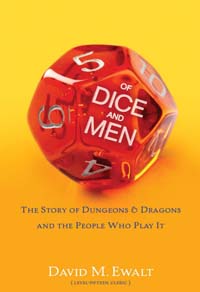Of Dice and Men is a disappointing book from numerous angles. As a long-term gamer and hobby-level historian trying to get some insight about D&D’s past, Dice does a poor job. Maybe Ewalt should’ve read Sean Howe’s book covering Marvel Comics to get a clue on how to approach the subject.
What I hated the most about Dice was his uninteresting attempts at fiction by “documenting” a narrative of the weekly game he plays in. I always feel cheated when a rule book or supplement wastes two or more pages on this crap. If I want to read mediocre fantasy literature, I’ll go to Half Price Books. Plus Ewalt forgot a universal law, “No one gives a shit about your game!”
Let me continue this review as an average reader (not a gamer) on why Dice is weak.
Ewalt begins with the history of D&D’s forerunners. He sprinkles in his personal experiences: learning chess with a highly-skilled co-worker; attends a miniatures convention to play historical-based stuff; dives back into D&D after going cold turkey for 10 years; and participates in a weekend-long LARP event. He had a great start by explaining to the audience what is in the hobby’s DNA—it’s an extension of military training from the 19th century. Hell, many of the people composing D&D’s first generation were mostly people I deride as armchair generals—guys who never served in the military yet blather on as self-appointed experts because they have all those Osprey books. Ewalt politely calls these gamers grognards, a nickname taken from Napoleon’s most-experienced soldiers. At GDW (a smaller game publisher I briefly worked for), we younger employees called them the “old-bearded-guy crowd” and these boring farts often showed open contempt for role-playing games.
Then the author moves on to tell the stories of D&D’s two primary creators, Gary Gygax and Dave Arneson. Both were avid fans of games. Arneson develops Blackmoor which plays more like those murder-mystery dinners at chain restaurants. Gygax sticks with miniatures-based games and forms a small publishing company (TSR) with his fellow players. Eventually the two meet and put their creations together to form the first version of D&D. Success comes slowly during the game’s inaugural year. By the late Seventies, TSR is a small company making enough money to provide full-time employment for several people. When the Eighties begin, D&D is a hot commodity. It’s also about the time Gary starts to make the company all about him as he cuts Dave out, claiming he did all the work. The validity of Gary’s assertion will never be resolved, both people are dead now. Having met other TSR people and interacted with Gary for his terrible comeback in 1992, I’d say there may have been very little truth to Dave’s “laziness.”
The narrative fizzles out by the mid-Eighties when Gary is kicked out of TSR by Lorraine Williams and gets fast-forwarded to the present. This is very unfair to the dozens of other writers, designers and editors who picked up the baton to continue D&D’s success for another two decades. The hobby’s growth may have slowed but TSR sold thousands of books, had two resurgences with new editions (namely 3E), founded an annual convention that outgrew Milwaukee and inspired scores of people in the computer and entertainment industry. Ever heard of Stephen Colbert or Vin Diesel? Millions of code monkeys cut their teeth writing character generator programs too before they laid down the online games WoW, Everquest and Ultima.
It’s as if Gary were the Sun King in Ewalt’s mind. Nothing makes it more apparent than when he documents his excitement about playing in a session with Gary’s oldest son Ernie. The thrill rapidly becomes a four-hour bummer due to Ernie wasting 90 minutes on character creation. (Saw it coming a mile away!)
Dice wraps up with Wizards of the Coast’s plans to revamp the game one more time through D&D Next. Ewalt receives a playtest copy and decides to run his own game using these rules to recapture the magic he remembered as a pre-teen.
To recap. Dice is a worthless book on two fronts. For gamers, it won’t tell them anything they didn’t already know (or thought they knew in some instances). For non-gamers, the awful fiction will bore them and thankfully it’s italicized, thus, they’ll know where to skip ahead to. Ewalt writes for Forbes as his regular gig, he should’ve pursued the business-history angle of the hobby. TSR made numerous marketing decisions which were brilliant and horrendous. Then sprinkle in all the industries the hobby has gone on to influence: computer games, film, literature, clothing, humor, etc.

